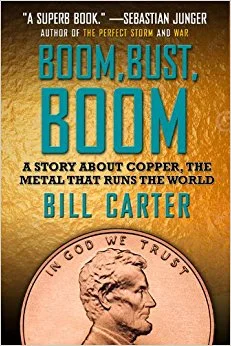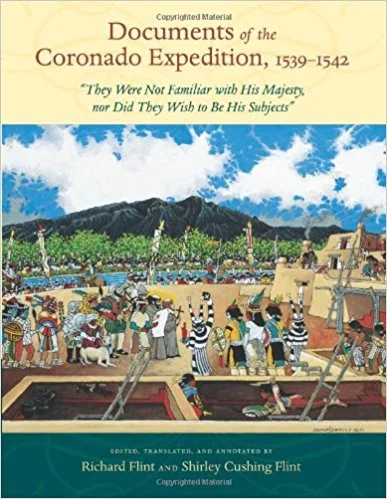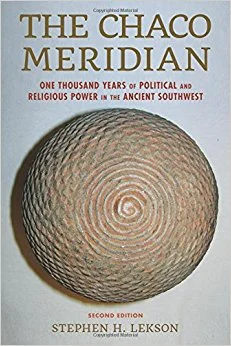Boom, Bust, Boom
Bill Carter has an existential problem: his love-hate relationship with modern civilization. He’s a beneficiary of the standard of living it provides and an avid consumer of the technology, tools and toys it produces: from airline travel to smart phones, iPads to automobiles, electric lights to modern health care. But he loathes the consequences of his love, to wit: the environmental and human impacts of the industries that supply the raw materials necessary to fabricate and fuel what he consumes, depends on, and enjoys. Carter is far from unique in this respect: the richer decile of the world’s population is full of similar discontents, most of them living in very comfortable circumstances provided by precisely the same civilization they decry.
As the result of presumed arsenic poisoning (and I’m a bit skeptical regarding his epidemiology here) induced by eating vegetables grown in the backyard garden of his home in the former copper mining boom-town of Bisbee Arizona, and of the threat of the mine re-opening, Carter embarks on an investigation and critique of the copper industry that takes him from Arizona to Mexico to Alaska and back again. Along the way he interviews and quotes mining detractors and boosters of various stamps, including company executives, employees and retirees, Native Americans, fishermen, geologists, hydrologists and so forth. While he fails, in my opinion, do the subject justice (it is, after all, at least one of the natural resources that the world runs on, to paraphrase his subtitle), it is a valiant, if fundamentally flawed attempt.
I’ll start with the minor annoyances, then move on to my major criticisms. The book is riddled with orthographic and punctuation errors (there is a flurry of misplaced hyphens and misspellings on pp. 82, mis-tabbed paragraphs are scattered throughout the book). Mining promoter Robert Friedland’s last name is spelled three different ways on pp.82-84, one of which may be an intentional attempt at humor (Fried-land for Friedland...ha, ha). I won’t hold Carter accountable for having a lazy editor, but there are a fair number of factual errors and some consistently prejudiced themes which I will hold him to. I’ll address two of latter. Firstly, the question: what kind of places mining towns are to live in? Statements like “Morenci feels like a Gulag with no joy” and “Drugs and mining go hand-in-hand” are symptomatic of his opinion that the only good mining town is one that’s died and been resurrected as an art colony/tourist trap (like Bisbee). If, in the course of the book, Carter meets someone who actually enjoys or feels nostalgic about mining town life, he says things like: “I can’t help but wonder if these feelings of nostalgia mask the manipulations of PD (the company that owned the mine Bisbee was built around) and the fact that the families were trapped in a spiral of economic dependence, a kind of corporate Stockholm syndrome.” Prefacing statements like the latter with phrases like “I can’t help but wonder” or “I imagine”, “I could be wrong, but” are covers used throughout the book for a lack of serious investigation into whether mining towns are any better or worse than towns with other economic bases or, indeed, whether mining as an industry is any better or worse than other industries. I grew up in mining towns around the West and, contrary to Carter’s assertions, found them great places to live. They were true melting pots of humanity: far more diverse than most small towns in America, with people come from around the world looking for a better life. They worked and fought both amongst each other and shoulder to shoulder. They were not immune to the struggles of their time (labor-management strife, xenophobia and racism of various stamps); in fact they were at the forefront of them. But the resulting towns evolved into vibrant multi-ethnic, multi-cultural communities that produced some great people. My mother and her family, of Dutch ancestry, who settled in the copper mining, milling and smelting towns of Ruth, Ely and McGill, Nevada, are my best example. Her brothers and sisters married Slavs, Mexicans and Greeks and nobody seemed much to care. It just gave them another picnic to go to for the national “day” of the new family member’s clan. Another favorite passage of mine: “When I think of it, every mining town I’ve visited has this unspoken code of emotional distance. No one will admit it, but I’m certain part of the training and perhaps an actual requirement for getting a job with a mining company is agreeing not to interact with the locals”. Hmmm...this statement crosses over into the absurd: in most mining towns the company employees are the locals!
The second theme I’d like to address is Carter’s assumption that the people who work in the mining industry only do so for a lack of other options or just for the fat paycheck, or because they have some critical moral faculty that was stillborn or that over the years was subsumed by hard economic realities, and that blinds them to the business’ shortcomings. He meets one mining company geologist in Bisbee who has a second home in Tucson and says he doesn’t know many locals and extrapolates from this to “This one candid admission by a geologist in Bisbee explains the distance I encounter when speaking to miners, geologists and supervisors in mining towns. I imagine that many of these geologists went to college to study dinosaurs and dreamed of becoming Indiana Jones. They may even have bonded with others in their field over their fierce resistance for working for mining companies. How long did it take to realize they needed a job and that mining companies are always hiring? Some probably took jobs, still nostalgic for their college dreams, and told themselves that they would join the company to ensure that someone as looking after the earth properly. Eventually they collect their paycheck and put their kids through high school and college. For twenty years they punch the clock. There is no shame in that. In fact, there is an honor in that, in providing for their families. What is strange is never getting to know a single person in the town they work.
I could be wrong [there’s one of those magic phrases], but this behavior typifies a person who either deems the locals unworthy of investing in or doesn’t want to get to know them in case one day he has to be the one who begins tearing up their town.”
Sorry Bill, but the largest employer of earth scientists, including geologists, is the petroleum industry, which you probably like even less than the mining business, not dinosaur research! My experience with mining professionals has been categorically different from Carter’s opinion, expressed above. Most are in the business because they are passionate about mining, they are fascinated by its history, its folklore, its dependence on and relationship to the earth, about facing its challenges, solving its problems and contributing to the betterment of the world and their communities through their chosen career and business, not in spite of it!
Yes Bill, there are mines that shouldn’t be built, but there are also books that shouldn’t be written, at least not without some more thorough research and a less biased point of view from the get-go. I’ve seen very few discontents like yourself who make the valiant if quixotic effort to renounce the benefits of civilization, along with the negative impacts, and live life a la paleolithic. Lynx Vilden is one of those few, and I admire her for it. You are not....you even fled Bisbee for Flagstaff instead of facing down the demon mining company and standing up for what you believe in!


